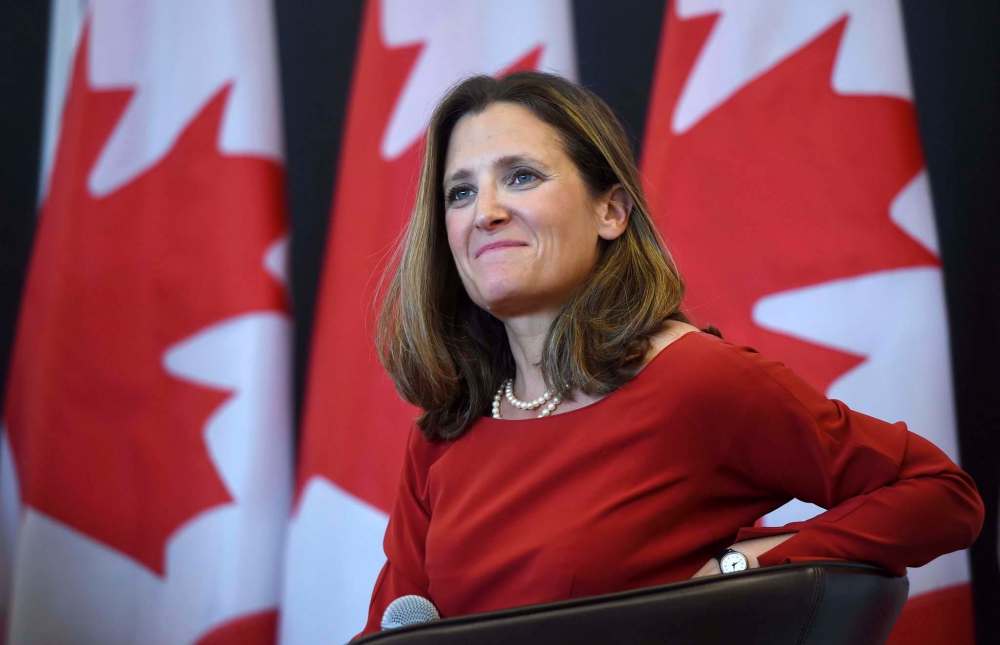Plan B unknown if NAFTA talks fail
Advertisement
Read this article for free:
or
Already have an account? Log in here »
To continue reading, please subscribe:
Monthly Digital Subscription
$19 $0 for the first 4 weeks*
- Enjoy unlimited reading on winnipegfreepress.com
- Read the E-Edition, our digital replica newspaper
- Access News Break, our award-winning app
- Play interactive puzzles
*No charge for 4 weeks then billed as $19 every four weeks (new subscribers and qualified returning subscribers only). Cancel anytime.
Read unlimited articles for free today:
or
Already have an account? Log in here »
Hey there, time traveller!
This article was published 14/08/2017 (2439 days ago), so information in it may no longer be current.
Foreign Affairs Minister Chrystia Freeland Monday dropped a gentle hint that she might walk away from trade talks with the United States if the deal is not good enough. Gentle hints, however, may not have much effect in Donald Trump’s Washington. The government should prepare Canadians — and our trade partners — for eventual news that the attempt to renegotiate the North American Free Trade Agreement has failed.
There are good reasons for expecting the attempt may fail. The Trump administration has said again and again its main aim in trade policy, including North American trade policy, is to alter the U.S. trade balance. U.S. trade volumes fluctuate widely from month to month but showed a deficit (excess of imports over exports) with the entire world of around US$40 billion a month for the last year.
Free trade agreements, however, do not regulate the balance of trade. The administration is therefore likely to be dissatisfied with any agreement that could emerge from the talks that are opening this week in Washington. They will want Canada and Mexico to agree to measures that will block Canadian and Mexican goods and services from entering the U.S., but we have no reason to agree to such a thing.

In particular, President Trump loves requiring the use of U.S. materials in U.S. public works projects, but he wants access for U.S. suppliers to government procurement in Canada and Mexico. If the U.S. really wanted an agreement, they would not come to the table with nonsense like that. U.S. trade-policy professionals know they have to offer something the other side can accept, but they are working for a president who may not understand this.
Ms. Freeland Monday outlined her plan for NAFTA renewal under the sunny view that NAFTA is good for all three countries and can be made even better. She warned gently that there may be rough moments during the negotiation. She recalled that she had to walk away from trade talks with the European Union when the Wallonian provincial authorities objected to the investor-rights provisions. She recalled also that Canada had to walk away from the 1987 talks for the original Canada-U.S. free trade agreement in order to compel U.S. agreement.
But if the American side knows that Canada is hungry for an agreement and cannot accept failure, then walking out of the store won’t have the desired effect. They’ll know we’re bluffing.
The Canadian public needs to be well-informed about where we’ll be the day the three governments announce that agreement on revision of NAFTA cannot be achieved. The Trump administration loves tearing up this and walking out of that. The wreckage of the Trans-Pacific Partnership and the Paris Climate Accord lie smoking on the ground to show how this administration operates.
Canada cannot put itself in the position of begging the U.S. for an agreement — any agreement — because we just can’t live without it.
The moment the talks fail should be prepared well in advance. Ms. Freeland should go well beyond the gentle hints and explain, as best she can, how Canada will trade with the U.S. and how the trade will be managed after failure of these talks. If the government does not brace the country for that possible result, then we’ll be begging and Washington will be dictating.



